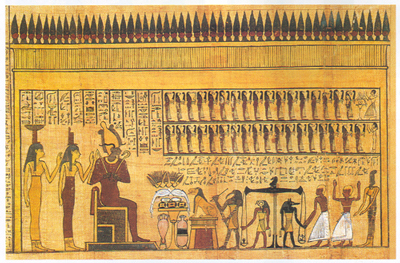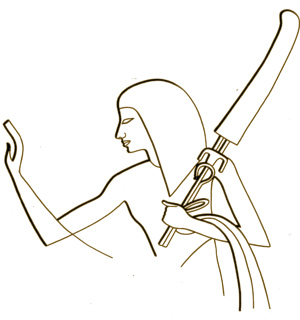Home Page
Kemet, Creation and Environmental Awareness
Lessons From 'The Confession Of Truth'

Today nations and peoples around the world are espousing the importance of 'Environmental Awareness' and 'Environmental Responsibility' in light of the destructive and debilitating impact ('environmental pathology') that their respective societies are having on plants (flora), animals (fauna), insects, atmosphere, earths surface, water, air, and other aspects of the environment in general. Because most societies - Western Europe, Asia (China, India), America, Russia, etc. - by way of their 'cultural orientation' are predisposed (naturally) towards being destructive they are experiencing serious difficulties in taking meaningful action; neither their political systems (capitalism, socialism, etc), nor their 'belief systems' - Judaism, Christianity, Islam, Hinduism, or Brahmanism) are orientated towards respect or appreciation of the environment, therefore it is extremely difficult, if not totally beyond their reach to move their citizens in the direction of care and responsibility for life and the environment.
However, Ancient Kemet from its beginnings as a society made 'Environmental Awareness' and 'Environmental Responsibility' a part of its cultural orientation and apparatus; respect for life and the environment, including the knowledge and awareness that we are biologically related to every aspect of creation served to preclude wanton destruction of life and the environment for selfishness, greed and any other pathology.
 One of Ancient Kemet's principal structures was its laws and customs reflected in the 'Confession of Truth'- also known as the 'Declaration Of Innocence' and 'Negative Confessions' - featured in the Book Of Coming and Going Forth By Day and By Night (misnomer: The Egyptian Book Of The Dead). In the 'Book of Coming and Going Forth…' there are scenes in which the deceased is shown going before Neter Ausar - the 'Earth Sovereign' - and 41 other Neteru - representatives of creation. This scene, in the 'Hall Of Justice' is called the 'Judgment Scene' in which the decease's heart is weighed on a scale against Neter Maat - the standard of truth - symbolized by a feather. Forty-two Neteru are there to bare witness to the pronouncements and judgment of the deceased. If the person spoke the truth he/she was granted immortality, if they lied - meaning that he/she in some way committed an offense against creation - was given to death, thus being deprived of immortality.
One of Ancient Kemet's principal structures was its laws and customs reflected in the 'Confession of Truth'- also known as the 'Declaration Of Innocence' and 'Negative Confessions' - featured in the Book Of Coming and Going Forth By Day and By Night (misnomer: The Egyptian Book Of The Dead). In the 'Book of Coming and Going Forth…' there are scenes in which the deceased is shown going before Neter Ausar - the 'Earth Sovereign' - and 41 other Neteru - representatives of creation. This scene, in the 'Hall Of Justice' is called the 'Judgment Scene' in which the decease's heart is weighed on a scale against Neter Maat - the standard of truth - symbolized by a feather. Forty-two Neteru are there to bare witness to the pronouncements and judgment of the deceased. If the person spoke the truth he/she was granted immortality, if they lied - meaning that he/she in some way committed an offense against creation - was given to death, thus being deprived of immortality.
In essence the laws prohibiting offense against creation and the environment are 'Cosmic Law' and 'Moral Law' - some refer to them as 'Universal Laws'. For those who currently live and practice the 'Kemetic Way Of Life' this is the body of law by which we are guided in our daily interactions, interdependence and relationships with the environment and creation. The incorporation of 'Cosmic Law' and 'Moral Law' into the daily life and practices of the above named societies would certainly help to stem the tide of destruction, as well as reorient, and change their direction towards 'Environmental Awareness' and Environmental Responsibility'.
It is in the following pronouncements to each representative of creation by the deceased that illustrates the Kemetic societal awareness and responsibility to the environment, and to creation as a whole. The names of each Neter that generally proceeds each pronouncement have been omitted:
'Confession Of Truth'
 I have not done iniquity
I have not done iniquity
I have not robbed with violence
I have not stolen
I have not murdered
I have done no harm
I have not minished oblations
I have spoken no lies
I have not snatched away food
I have not caused pain
I have not committed fornication
I have not caused shedding of tears
I have not dealt deceitfully
I have not transgressed
I have not acted guilefully
I have not laid waste to the ploughed land
I have not been an eavesdropper
I have not set my lips in motion against any person
I have not been angry and wrathful without just cause
I have not defiled the mate of another person
I have not polluted myself
I have not caused terror
I have not transgressed
I have not burned with rage
I have not stopped my ears to right and truth
I have not worked grief
I have not acted with insolence
I have not stirred up strife
I have not judged hastily
I have not gossiped
I have not done harm nor ill
I have not cursed the leader
I have not fouled the water
I have not spoken scornfully
I have not cursed the Ntcheru
I have not stolen
I have not defrauded the offerings
I have not plundered the offerings to the deceased
I have not taken the food of a child
I have not slaughtered with evil intent the cattle of the Ntcheru
I have not lied
I have not killed
I have not sinned
Image Sources:
The Papyrus Of Hor - Malcolm Mosher, Jr, The British Museum Press
The Egyptian Book Of The Dead: The Book Of Going Forth By Day - Raymond Faulkner, Chronicle Books
© 2010 Heru-Ka Anu / Ta-Nefer Ankh